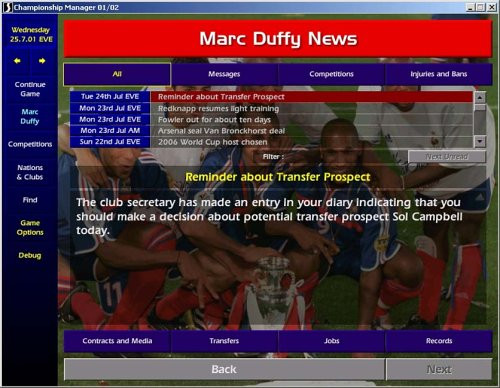

However, it’s worth bearing in mind that the opposition is likely to be doing the same, so just how much valuable information you gather during this time is always open for debate. These games are designed to give your players the chance to gain match practice before the proper season begins, but also to give you the opportunity to experiment with formations and tactical settings. And until you’ve played a number of matches, it’s hard to get a feel for a team that you don’t know very well.įortunately, that’s exactly what preseason is for, with a raft of friendly matches that will have been arranged for you.

Of course, there’s far more to take into account than bare stats alone–the age, morale, and general happiness of a player can contribute to whether or not he’ll perform. It’s important, especially at lower-level clubs, to spend some time looking at the players’ statistics–of which there are many–to see who might perform well in any given position. First of all, you’ll need to think carefully about the players at your disposal and whether you want to mould a team around a certain formation, or vice versa. Once that’s done, and you’ve decided on a team, you’ll be responsible for pretty much every decision you can think of that a football manager in real life would make. It’s common to choose the country you want to start in, as well as a few others, and it’s possible to limit the number of leagues playable within a given country. If you’ve got an older machine, it’ll help to keep the number of active leagues relatively low and simulate the rest, although you can only take jobs from active leagues as determined at the start of the game. But if you decide to opt for the likes of Farnborough Town, which would probably just settle for avoiding relegation from the English Conference South, a different kind of challenge would await you.īut your first choice, once you’ve set up your own manager’s profile, is to work out which leagues you want to run and how much detail you’d like the game to go into. Chelsea, for example, would no doubt demand an excellent showing in the English Premier League, as well as a more-than-respectable level of advancement in the Champions’ League. What that glory might be will depend on your choice of team. This year’s iteration is undoubtedly the most convincing edition yet and gives you the task of choosing any team from a total of 63 league tiers in 26 countries with which to find glory. Unfortunately their initial attempts frankly weren’t up to scratch but with the benefit of time and stability under the new SCi-Eidos regime, the team has succeeded in building those early efforts into something far more worthy of the CM brand. Originally developed by Sports Interactive, the game has been the responsibility of Beautiful Game Studios (BGS) since 2004. Championship Manager is a name that has become synonymous in the UK for over a decade with the concept of a great, in-depth football management game.


 0 kommentar(er)
0 kommentar(er)
